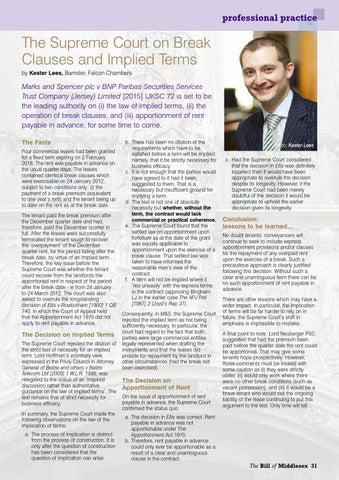professional practice
The Supreme Court on Break Clauses and Implied Terms by Kester Lees, Barrister, Falcon Chambers
Marks and Spencer plc v BNP Paribas Securities Services Trust Company (Jersey) Limited [2015] UKSC 72 is set to be the leading authority on (i) the law of implied terms, (ii) the operation of break clauses, and (iii) apportionment of rent payable in advance, for some time to come. The Facts Four commercial leases had been granted for a fixed term expiring on 2 February 2018. The rent was payable in advance on the usual quarter days. The leases contained identical break clauses which were exercisable on 24 January 2012, subject to two conditions only: (i) the payment of a break premium (equivalent to one year’s rent) and the tenant being up to date on the rent as at the break date. The tenant paid the break premium after the December quarter date and had, therefore, paid the December quarter in full. After the leases were successfully terminated the tenant sough to recover the ‘overpayment’ of the December quarter rent, for the period falling after the break date, by virtue of an implied term. Therefore, the key issue before the Supreme Court was whether the tenant could recover from the landlords the apportioned rent in respect of the period after the break date - ie from 24 January to 24 March 2012. The court was also asked to overrule the longstanding decision of Ellis v Rowbotham [1900] 1 QB 740, in which the Court of Appeal held that the Apportionment Act 1870 did not apply to rent payable in advance.
The Decision on Implied Terms The Supreme Court rejected the dilution of the strict test of necessity for an implied term. Lord Hoffman’s vcontrary view, expressed in the Priviy Council in Attorney General of Belize and others v Belize Telecom Ltd [2009] 1 W.L.R. 1988, was relegated to the status of an ‘inspired discussion rather than authoritative guidance on the law of implied terms’. The test remains that of strict necessity for business efficacy. In summary, the Supreme Court made the following observations on the law of the implication of terms: a. The process of implication is distinct from the process of construction. It is only after the question of construction has been considered that the question of implication can arise.
b. There has been no dilution of the requirements which have to be satisfied before a term will be implied; namely, that it be strictly necessary for business efficacy. c. It is not enough that the parties would have agreed to it had it been suggested to them. That is a necessary but insufficient ground for implying a term. d. The test is not one of absolute necessity but whether, without the term, the contract would lack commercial or practical coherence. e. The Supreme Court found that the settled law on apportionment upon forfeiture as at the date of the grant was equally applicable to apportionment upon the exercise of a break clause. That settled law was taken to have informed the reasonable man’s view of the contract. f. A term will not be implied where it ‘lies uneasily’ with the express terms in the contract (approving Bingham LJ in the earlier case The APJ Priti [1987] 2 Lloyd’s Rep 37). Consequently, in M&S, the Supreme Court rejected the implied term as not being sufficiently necessary. In particular, the court had regard to the fact that both parties were large commercial entities legally represented when drafting the instruments and that the leases did provide for repayment by the landlord in other circumstances (had the break not been exercised).
The Decision on Apportionment of Rent On the issue of apportionment of rent payable in advance, the Supreme Court confirmed the status quo:
Photo: Kester Lees c. Had the Supreme Court considered that the decision in Ellis was definitely incorrect then it would have been appropriate to overrule the decision despite its longevity. However, if the Supreme Court had been merely doubtful of the decision it would be appropriate to uphold the earlier decision given its longevity.
Conclusion: lessons to be learned… No doubt tenants’ conveyancers will continue to seek to include express apportionment provisions and/or clauses for the repayment of any overpaid rent upon the exercise of a break. Such a precautious approach is clearly justified following this decision. Without such a clear and unambiguous term there can be no such apportionment of rent payable in advance. There are other lessons which may have a wider impact. In particular, the implication of terms will be far harder to rely on in future; the Supreme Court’s shift in emphasis is impossible to mistake. A final point to note; Lord Neuberger PSC suggested that had the premium been paid before the quarter date the rent could be apportioned. That may give some tenants hope prospectively. However, those comments must be treated with some caution as (i) they were strictly obiter, (ii) would only work where there were no other break conditions (such as vacant possession), and (iii) it would be a brave tenant who would risk the ongoing liability of the lease continuing to put this argument to the test. Only time will tell…
a. The decision in Ellis was correct. Rent payable in advance was not apportionable under The Apportionment Act 1870. b. Therefore, rent payable in advance could only ever be apportionable as a result of a clear and unambiguous clause in the contract.
The Bill of Middlesex 31
